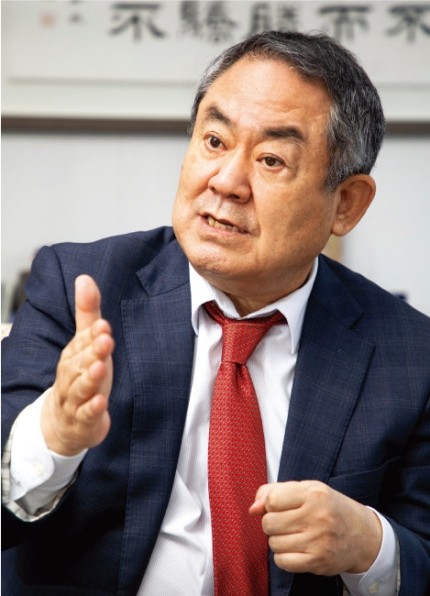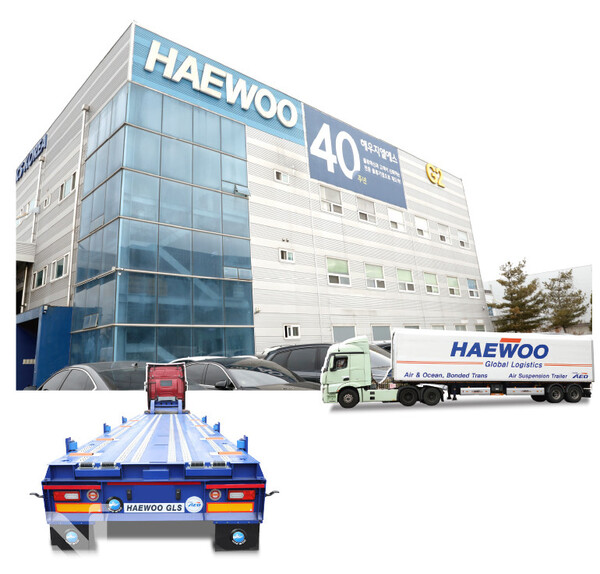Prospects for Korea's Logistics Industry and Mega-City Planning

“Decades ago, our economy grew with manufacturing, now we need to promote logistics industry”
The following article is based on details exchanged with Chairman Kim Jin-il of the Korea Logistics Business Cooperative by Vice Chairman Choe Nam-suk of The Korea Post media, publisher of 3 English and 2 Korean-language news publications since 1985.—Ed.
Chairman Kim Jin-il is a "Logistics Man" who served as the first-term chairman of the Korea Integrated Logistics Association and has been in the logistics industry for the past 40 years now.

He founded Haewoo GLS in 1983 and has been at the forefront of technological innovation, developing Korea's first 'air cushion' for transportation of precision equipment in 1987.
In particular, Chairman Kim recently produced a specially designed 'automatic loading and unloading trailer' and achieved an express delivery innovation that quickly and safely transports high-value semiconductor equipment worth 300 billion won per unit directly to the customer's desired destination without intermediate loading or unloading step, and led the company to grow into a global comprehensive logistics company with annual sales of more than 100 billion won.
This is the result of 40 years of relentless innovation in logistics processes and accumulated logistics know-how by its founder, Chairman Kim Jin-il. We caught up with Mr. Kim to learn more about the future of the Korean logistics industry and his plans for the controversial 'megacity'.
The outlook for the Korean logistics industry:
Decades ago, Korea's economy grew by choosing the path of manufacturing, but now the country needs to find the next industry and promote the logistics industry as a future growth engine and logistics as a core industry in Korea.
Powerhouse countries such as Singapore and the Netherlands have developed logistics as a national industry, and Korea should also industrialize the logistics.
We should industrialize the logistics industry.
Although the term logistics industry is used, it is often classified as a service industry in government policy, and there are three government ministries that oversee the logistics industry.
The Ministry of Land, Infrastructure & Transport is in charge of the infrastructure needed for logistics, including air and railways, roads, and warehouses, while the Ministry of Oceans, Maritime Affairs & Fisheries is in charge of shipping, and the Ministry of Trade, Industry & Energy is in charge of distribution and logistics.
The functions of the three ministries should be merged to create the Ministry of Logistics Industry, and the National Logistics Industrialization Promotion Headquarters under the President should also be established to serve as a control tower for the logistics industry.
In the Fourth Industrial Revolution, we talk a lot about manufacturing innovation, but more importantly, logistics innovation, and if the production, storage, and transportation of logistics are optimized through technological innovations such as artificial intelligence, the Internet of Things, robots, and drones, costs will be reduced and industrial competitiveness will be further increased. So, the logistics should be developed into a "second industry" that will be responsible for the future of the Korean economy after manufacturing.
MSC, the world's second-largest shipping company, is Swiss. Switzerland, a landlocked country without an ocean, but it has created a global shipping powerhouse.
It's fair to say that the country has turned shipping into a powerful industry. The key to this is the power of finance. When a shipping company buys a new ship, its debt ratio is bound to increase.
We need financial and tax incentives for logistics companies, not just shipping.
Establishing 'logistics industry cooperatives' and 'logistics industry banks' modeled after agricultural cooperatives could be one way. Germany's DHL, the No. 1 global express delivery company, had sales of 90.52 trillion won in 2020. Compared to logistics subsidiaries of Korean conglomerates with trillions of won in sales, it is a giant.
In order to increase industrial competitiveness, it is urgent to grow in size. This is difficult for individual companies. The government should promote third-party logistics rather than company-specific logistics.
Mega-city initiatives: The way of approaching must be changed.
The "megacity" debate is heating up as the People's Power Party is pushing for the incorporation of Gimpo City into Seoul as a party platform ahead of the general election.
In addition, the 'megacity' controversy is expanding across the country with the announcement of Chairman Choi Kyung-tae's position that "Seoul will be the catalyst and we will do our best to realize a three-axis megacity of Seoul, Busan and Gwangju, and a 'super metropolitan megacity' connecting Daejeon and Daegu inland cities."
As an entrepreneur who has been working in the logistics field for more than 40 years, I can't help but feel frustrated.
Such a big project as the megacities should be preceded by a multifaceted review and preparation work at the pan-governmental level, and the approach to this issue should be changed from the beginning.
A piecemeal, microscopic approach to improving the lives of local residents and reforming administration is a recipe for conflict that recurs every election season.
The idea of megacities requires a macro approach that aims to stipulate the country's innovation, upgrade the national territory, and balance the development of metropolitan and rural areas.
Today, urban concentration is a global trend, with megacities of tens of millions of people growing rapidly, and the global economy and industry moving toward clusters.
Los Angeles and San Francisco in the western United States, New York and Pennsylvania in the eastern United States, and the Tokyo-Osaka-Nagoya triangle in Japan are forming vast megacity areas that encompass the surrounding regions.
The era of competition between cities, not countries, has begun in the real earnest. A time is coming when megacities will be connected to each other by bullet trains that are faster than airplanes, and each will function as a city-state. This is an irresistible trend in the global era
of the global world.
How will the world change if megacities such as the Seoul Metropolitan Area, Busan and Gwangju build transportation networks in the 20s?
You can commute from Seoul to Busan or Gwangju, work anywhere in the country, and spend the evening at home with your family.
If you can commute to Seoul, Busan or Gwangju and work anywhere in the country and spend the evening at home with your family, would there be a paradise elsewhere?
Since CEO Elon Musk of Tesla unveiled the concept of a "hyperloop" that would move vehicles at high speeds through a tunnel-like vacuum tube between cities in the western United States in 2013, countries around the world have been competing in the real earnest to develop the technology for commercialization.
Korea announced the world's first commercialization in 2009.
In recent years, it has been among the leaders in this field, having developed and successfully conducted short-distance driving tests of ultra-high-speed maglev vehicles and propulsion technology.
If the Korea Institute of Railroad Technology succeeds in commercializing the Korean Hyperloop Capsule Train with a top speed of 1,200 kilometers per hour, it will be able to cover the distance between Seoul and Busan, a distance that takes two and a half hours by KTX, in 20 minutes.
The success of megacities depends on this next generation of transportation. Political leaders should try to come together to seriously discuss multi-faceted support measures for the introduction of high-speed capsule trains, and megacities should be promoted in terms of, and for the benefit of, balanced national development.
If universities, general hospitals, manufacturing plants, and companies are evenly distributed and reorganized throughout the country centered on regional megacities, the side effects of the current concentration of population in the capital will naturally disappear.
Korea has achieved the ‘Miracles of the Han River’ by choosing the path of manufacturing from the ruins of war, and Korea is now a major player in the IT area in the entire world--semiconductors, secondary batteries, shipbuilding, defense, nuclear power, and other high-tech industries.
Now, Korea need to find the engine of future growth in the industrialization of logistics.
The global logistics market is expected to grow by 10% annually, reaching US$16 trillion by 2030.
Climate change and the upgrading of the 4th generation logistics services are foreshadowing a major transformation of the logistics industry. Fortunately, Korea has the natural geographical conditions to become a global logistics leader.
When Arctic sea ice allows commercial ships to operate around 2035, most Asian ships are expected to head to Europe via Busan.
If the 20,000-kilometer route from Busan to Rotterdam, the Netherlands, via the Suez Canal, is replaced by the Arctic Route, it will shorten the journey by about 7,000 kilometers. The opening of the Arctic Ocean route will enable Busan to become the largest hub port in Asia.
For us, it is an opportunity to realize our dream of becoming the largest global shipping and logistics powerhouse through the convergence of shipbuilding and shipping industries centered on Busan Port. Korea can become a terminal point not only for maritime logistics but also for land logistics using continental railroads.
Currently, the process of transporting rail cargo to Europe is too complicated. Cargo has to be transported by ship to Vladivostok, Russia, and then use the Trans-Siberian Railway.
If the railroad is connected by an agreement between North and South Korea, our railroad area will extend to Russia, Central Asia, and Europe. Moreover, if a gas pipeline between Russia, North Korea, and South Korea becomes a reality, South Korea will become the center of resource and distribution logistics in Northeast Asia and the center of Northeast Asia's resources and distribution logistics.

